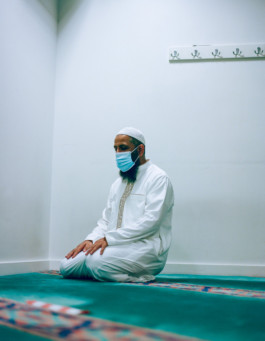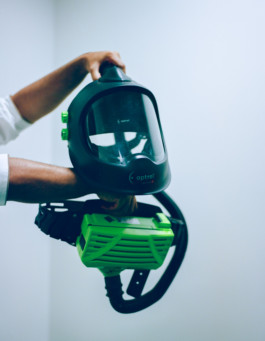Yunus: “To bury the deceased without the washing and shrouding will later on affect the grieving process of the family members”


listen:
Content warning: contains descriptions of death, dying and bereavement
Photography: Myah Jeffers
Audio Producer: Eloise Stevens
read:
Normally, I put this hood on, like this. And then this is a belt that would be worn around my waist. This is for air going in to the hood.
This is how I used to go into the ITU unit in Excel. And as you can see, they could see my face. They can hear me. And even with the prayers that I was doing with the patient, they could hear me as well if they were conscious, which made a big difference.
This hood, I think it’s used by those who do welding in normal days, but very, very useful to have this hood if you’re an Imam because most Imams, if not all, have a beard. So they won’t be able to wear that mask. But the difference was, they could always see my face and my smile, which I never knew until after one of the nurses came and told me how much comfort she used to receive whenever we used to go in with these masks where they could see my face.
My name is Imam Yunus Dudwhala, I’m the Head of Chaplaincy at Barts Health NHS Trust.
One of the weeks in March, it became quite clear that this is not going to go away, but it’s going to get worse. And it was within those few weeks that the Nightingale Hospital in Excel was being prepared. And I was called to try and help organise the chaplaincy department and the bereavement services for Nightingale.
The number of cases started to increase. And then we started to see from the Muslim community – especially people who I knew, or the families who knew me – their loved ones going into the hospital. I started getting calls directly to say, ‘Imam, please can you go and see my father’ or ‘My brother’. And visiting had stopped, totally. And so many times, the last time a person saw their loved one was when they went into the ambulance. So we started going to see those patients, with full PPE. And we facilitated video calls for families because they couldn’t be there. But we wanted them to see their loved one – we wanted them to see, be there virtually. And I remember there’s a gentleman who became ill, at that time he was in a mask, yet he was able to gesture to the family. He was able to acknowledge and the family’s saying to him, we will see you home soon.
It was a Saturday night, Sunday morning where I felt the fever. I got tested on Tuesday and Thursday was confirmed that I had Covid. The consultant from ITU rang me and he said, ‘Yunus, please can you support the family because he’s taken a turn for the worse, and he’s not going to make it. And we’ve got one of the daughters here, but the rest of the family is at home’. So the daughter who was there – she was in full PPE. She held the tablet and I connected from here and the rest of the family connected: one daughter in Manchester, the son and his whole family, the mother, some of the cousins, the children, grandchildren. Everyone was there. And we prayed for this gentleman who was dying.
This is the opening chapter of the Quran, it’s called Surah Al-Fatiha and it’s recited upon those who are sick. And these verses are known as verses of healing, verses of Shifa. In my prayers, I will say, ‘God, you are the most powerful. You are the one who decides what’s going to happen to someone. And if you have written that this person will stand up again and walk out of this hospital, then we don’t need any doctors, because that’s your power. But even if we have 100 doctors and you haven’t written that that person will stand, then that person will not stand up’. In my prayers I try and remind the family that this is their belief. So you’re preparing the mind.
It was one of the most intense situations for me. I was sitting on my bed in isolation, praying with this family, whilst their loved one is dying. You know, I’ve done that with presence previously, lots of times. But this one was totally different, because I’m here in my house, on a bed, sitting there. And all the families are connected virtually, I can see the patient through a lens, with one of the daughters there next to her father. And it was surreal in a way, but it was peaceful, it was bringing contentment to the family at the time of a traumatic death. And after around 50 minutes, we stopped, and he died no longer than half an hour later.
One of the rituals, and one of the rights of a deceased is that you wash their body and you shroud their body before you send someone to the next life. You want them to go in a clean and pure way. So you have to wash the body. You can just put water over them - that can be sufficient. But there’s a certain ritual way that you start from this hand and that hand and you do the face and then you do the arms, etc, etc. But in reality it’s just washing the body and making sure it’s clean before it goes to the grave. And also we shroud the body, and the shrouding is done with three pieces of cloth. And they’re white pieces of cloth. And it’s like a reminder for those who are living, that no matter what you had in this world, you go with nothing. So there was a discussion within Imams as to whether that is still the right thing to do because of the virus. Some Imams were saying ‘You don’t do it, you just bury them’. Some were saying ‘No, you just put some dry sand over the bag, body bag’. Whereas there was myself and others who said ‘Well, to bury the deceased without the washing and shrouding will later on affect the grieving process of the family members. So we need to do if we can do it safely’. And we spoke to a Virologist and they gave us guidance as to how to do it safely. And we then prepared videos, we trained Imams, and that way we were able to carry out the washing and the shrouding.
To be involved with families at a time when something important is happening like that, it’s… it is a privilege because you are being allowed to enter into their space at a very critical moment, a very vulnerable moment. And you’re there to try and give them strength at the time of vulnerability. You’re there to try and give them a hope or to create a mindset for them which will make it easy for them. So, for me, being at home isolating and yet still being able to support, it was a huge honour. Huge honour.
An Empathy Museum project made with the support of NHS England and NHS Improvement, The Health Foundation, and Arts Council England